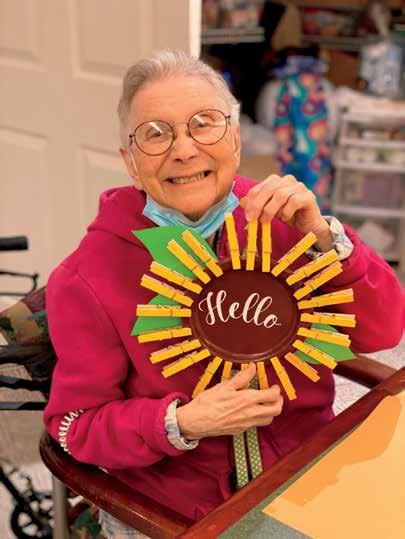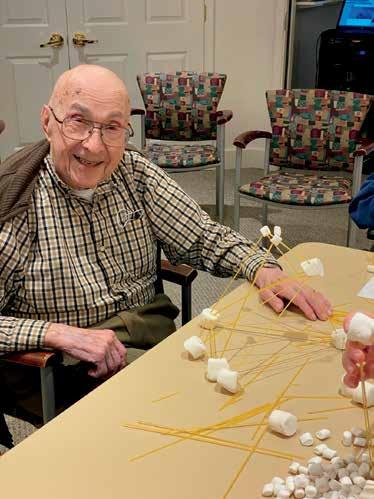
3 minute read
Hobby Habits
Why hobbies are good for you mentally and physically
BY JOHN TORSIELLO
Advertisement
sureNotwhat to do in the free time you’ve found post-retirement or even as you’re winding down from full-time work? Taking up a new hobby or spending more of your newly found free time on a passion you’ve always had but have put on the back burner while working can be good for you mentally and physically.
“Hobbies can be a great way to stay mentally and physically active, which can help postpone age-related diseases such as dementia and Alzheimer’s disease by helping increase neuroplasticity,” says Beth Ehrichs, a life and executive coach and therapist in Albany. “That means your brain stays more flexible, just like your muscles do with training and stretching.”
Hobbies can also help adults meet new friends and increase their social support network or “village.” “Expanding your village and staying active socially as you age helps to stave off depression and loneliness,” Ehrichs says. “Many people 55+ become lonely as their children grow up and move out. Hobbies help reduce the void that frequently comes when the years of prioritizing your kids’ needs come to a full stop. Hobbies are also a great way for couples to reconnect after the kids move on to adulthood.”
If your hobby of choice is a more sedentary one crossword puzzles, building models or knitting Ehrichs suggests adding another more physical pastime to the mix for optimal health. “One way to counter the negative effects of hobbies that have you sitting for long periods of time is to incorporate a second hobby such as walking several times a week with friends or family.”
Judy Torel, a certified life coach and personal trainer with a focus on people over 50, thinks hobbies can also help older people relax a bit from the information overload so common in today’s world. “When you practice and become proficient at a hobby, then your brain can actually go into autopilot mode and you can give it some time away from the daily barrage of new information and stimulus,” she says. “Hobbies such as sculpting or painting or knitting or sewing or gardening or walking all serve the purpose of providing ‘active mental rest,’ which is becoming uber-important in our current culture and in our second 50 years on the planet.”
Hobbies with repetitive movements or patterns provide a necessary mental reprieve, she says. “So, walking or jogging or elliptical machines, pottery wheel clay-making, knitting, digging in the dirt (gardening), swimming, bicycling indoor or outside, jewelry-making, calligraphy, dancing, golfing, tennis, woodworking, and martial arts are some ideas that involve repetitive movements so you can be conscious but also ‘zone out’ mentally from thinking about other things at the same time,” Torel says.
Tom D’Agostino, a clinical psychologist in Albany, believes hobbies can provide purpose in a person’s life at a time when people may be struggling to fill the void in a life that once revolved around working. “One of the most important aspects is that human beings strive for purpose. Our mental health can suffer when our actions are disconnected from intent, meaning and values,” he says. “While hobbies do not solve that dilemma, they can provide a vehicle.”
No one hobby is better than another, says D’Agostino. “That’s the cool thing. We have the freedom to define and learn what works best for us,” he says. “Obviously there are some limitations to that. I will say that in general hob - bies that are destructive to our physical or mental health wouldn’t be in the category of ‘better.’ I’d also add that hobbies that are unrealistic given our circumstances can also become about something else and ultimately hurt our mind and body.”
David Seedy, managing partner of Flights2 Gamestore and Hobbies in Albany, says the period of isolation brought on by the COVID pandemic, while “awful,” was also a blessing as it relit long-forgotten loves of a simpler time with closeted hobbies. “There was a resurgence and explosive interest all of a sudden in all things hobby-related,” he says. “It was a refreshing breath of air for the industries that have been waning for almost two decades.”
While many may not consider volunteering a hobby, Erichs says volunteering can be a great way to boost your positive mood and feeling of being necessary, especially after retirement. “Volunteering with those less fortunate also helps us keep a positive perspective as we develop various aches and pains and other ‘delights’ of aging,” she says. “Helping others has been shown to improve our sense of well-being.”

There are as many hobbies as there are people, it seems. Model train collecting and building is a multimillion dollar industry that attracts kids and seniors alike. While there is an initial investment in the proper tools and equipment, woodworking is another hobby that attracts older individuals with time to spend in the shed or basement making a special chair or table for the home. Restoring automobiles is a hobby that attracts individuals nostalgic about the past.
It’s all a matter of choosing what’s right and fun for you and doing something that fits into your schedule or time allotment. Hobbies can keep our minds fresh and engaged and when that happens, the body follows. n











